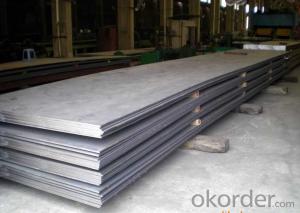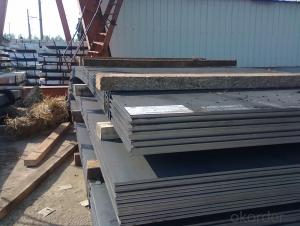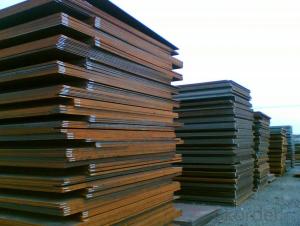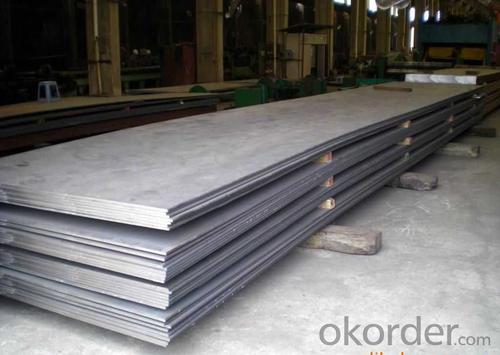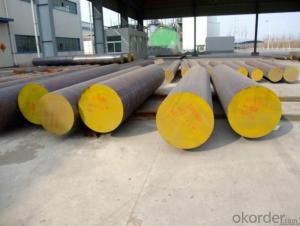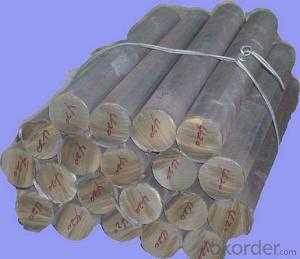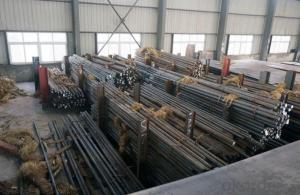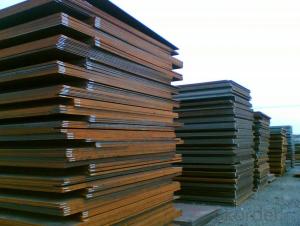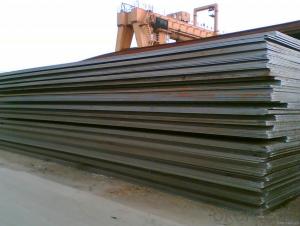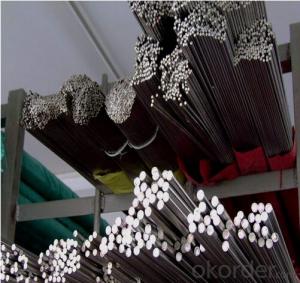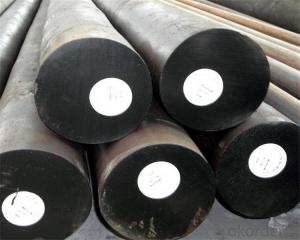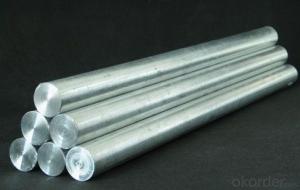Steel Plate DIN 1.2344 Special Steel Carbon Steel
- Loading Port:
- China main port
- Payment Terms:
- TT OR LC
- Min Order Qty:
- 25 m.t.
- Supply Capability:
- 10000 m.t./month
OKorder Service Pledge
Quality Product, Order Online Tracking, Timely Delivery
OKorder Financial Service
Credit Rating, Credit Services, Credit Purchasing
You Might Also Like
Specification
Type:
Alloy Steel
Shape:
Steel Sheet
Standard:
ASTM,JIS,EN,API,DIN,BS,GB,AISI
Surface Treatment:
Dry,Oiled,Color Coated,Copper Coated,Coated,Galvanized,PVDF Coated,Bright,Polished,Chromed Passivation,Black
Shape:
Round,Hexagonal,C Channel,Square,U Channel
Technique:
Spring,EFW,Extruded,Forged,ERW,Cold Drawn,Cold Rolled,Hot Rolled
Certification:
BSI,UL,API,CE,RoHS,IBR,BV,SGS,ISO
Steel Grade:
A53(A,B),20#,10#,SS400-SS490,600 Series,400 Series,300 Series,200 Series,HRB400,RHB335,Q235B,Q215B,Q235,Q215,Q195
Thickness:
as required
Length:
as required
Net Weight:
as required
Chemical Composition%
| Country | Standard | C | Si | Mn | Cr | Mo | V | S | P |
| China(GB) | 4Cr5NoSiV1 | 0.32-0.45 | 0.80-1.20 | 0.20-0.50 | 4.75-5.50 | 1.10-1.75 | 0.80-1.20 | ≤0.030 | ≤0.030 |
| USA(ASTM) | H13 | 0.32-0.45 | 0.80-1.20 | 0.20-0.50 | 4.75-5.50 | 1.10-1.75 | 0.80-1.20 | ≤0.030 | ≤0.030 |
| Germany(DIN) | 1.2344 | 0.37-0.42 | 0.90-1.20 | 0.30-0.50 | 4.80-5.50 | 1.20-1.50 | 0.90-1.10 | ≤0.030 | ≤0.030 |
| Japan(JIS) | SKD61 | 0.37-0.42 | 0.90-1.20 | ≤0.50 | 4.50-5.50 | 1.00-1.50 | 0.80-1.20 | ≤0.030 | ≤0.030 |
Available Size
| Rolled flat steel | 20-90mm×205-610mm×L |
Heat Treatment
| Item | Temperature℃ | Hardness |
| Anneal | 750-800 | ≤229HB |
| Quenching | 1020-1050 | 56-58HRC |
| Quenching | 530-600 | 45-50HRC |
Characterstics
| 1.Higher thermal strength and hardness | ||||||
| 2.Better toughness and elevated temperature fatigue resistance | ||||||
| 3.Hardness maintaining ability at 600℃ | ||||||
| 4.Good polishing performance |
Applications: Suitable for aluminum and copper die-casting moulds working for long time at elevated temperatures,hot extrusion dies,core rod forging dies,plastic moulds,etc,also suitable for heat resistance thimbles,push rods and ejector sleeves


- Q: What are the applications of special steel in the food processing industry?
- Special steel is widely used in the food processing industry due to its unique properties. It is utilized for manufacturing various equipment and components that require high strength, corrosion resistance, and hygiene standards. Some applications include the production of food processing machinery, cutting tools, knives, blades, and containers. Special steel ensures durability, cleanliness, and safety, making it an indispensable material in the food processing industry.
- Q: What is the role of special steel in the defense industry?
- Special steel plays a crucial role in the defense industry by providing materials with exceptional strength, durability, and resistance to extreme conditions. It is used in the manufacturing of various defense equipment, including armored vehicles, naval vessels, aircraft, and firearms. Special steel ensures superior performance and protection, helping to enhance the safety and effectiveness of military operations.
- Q: How are tungsten alloys used in the defense industry?
- Tungsten alloys are commonly used in the defense industry due to their exceptional properties such as high density, strength, and resistance to heat and corrosion. These alloys are used in various applications including armor piercing ammunition, kinetic energy penetrators, and armor plating for military vehicles and aircraft. Their ability to withstand extreme conditions and penetrate hardened targets make tungsten alloys vital for enhancing the effectiveness and protection capabilities of defense systems.
- Q: Can special steel be used in the electronics manufacturing industry?
- Yes, special steel can be used in the electronics manufacturing industry. Special steel alloys, such as stainless steel or high-strength low-alloy (HSLA) steel, offer excellent properties like corrosion resistance, electrical conductivity, and magnetic shielding, making them suitable for various electronic components like connectors, sensors, circuit boards, and casings. These specialized steel materials ensure durability, protection, and reliable performance in demanding electronic applications.
- Q: What are the different applications of high-speed special steel?
- High-speed special steel is a type of steel specifically designed to endure high temperatures and maintain its hardness at high speeds. Its exceptional properties make it suitable for a wide range of applications in various industries. Some of the diverse uses of high-speed special steel include: 1. Cutting Tools: In the manufacturing of drills, milling cutters, taps, and saw blades, high-speed special steel is extensively employed. Its outstanding hardness, heat resistance, and wear resistance make it perfect for machining operations involving high temperatures and high-speed cutting. 2. Aerospace Industry: High-speed special steel is extensively utilized in the production of aircraft components in the aerospace industry. It is employed to manufacture turbine blades, engine parts, and other critical components that require exceptional strength, resistance to high temperatures, and excellent fatigue resistance. 3. Automotive Industry: The automotive industry incorporates high-speed special steel in the manufacturing of engine components, gears, and bearings. Its ability to endure high temperatures, resist wear, and provide strength makes it suitable for various automotive applications. 4. Power Generation: High-speed special steel is employed in power generation industries such as thermal power plants, nuclear power plants, and wind energy. It is used to manufacture turbine blades, rotors, and other components that operate at high temperatures and high rotational speeds. 5. Tool and Die Making: The tool and die making industry extensively utilizes high-speed special steel where precision and durability are crucial. It is employed to produce molds, dies, punches, and other tooling components that require exceptional strength, wear resistance, and toughness. 6. Medical Instruments: High-speed special steel is increasingly being used in the medical field to manufacture surgical instruments, dental tools, and implants. Its corrosion resistance, high strength, and biocompatibility make it suitable for medical applications. 7. Industrial Machinery: High-speed special steel finds applications in various industrial machinery such as bearings, gears, shafts, and cutting tools. Its ability to endure high temperatures, resist wear, and provide strength contributes to the efficiency and reliability of industrial equipment. In conclusion, high-speed special steel is a crucial material that finds numerous applications across industries. Its unique properties, including high temperature resistance, hardness, wear resistance, and strength, make it essential for cutting tools, aerospace components, automotive parts, power generation equipment, tool and die making, medical instruments, and industrial machinery.
- Q: What are the properties of corrosion-resistant alloy steel?
- Corrosion-resistant alloy steel possesses properties such as high resistance to rust, corrosion, and oxidation, making it suitable for applications in environments exposed to moisture, chemicals, or extreme temperatures. It typically contains elements like chromium, nickel, and molybdenum, which enhance its resistance to corrosion. Additionally, this type of steel is known for its durability, strength, and ability to maintain its integrity in challenging conditions.
- Q: How is electrical steel used in the manufacturing of transformers?
- Electrical steel, also known as transformer steel, is a specialized type of steel used in the manufacturing of transformers. It is primarily used as the core material in transformers due to its unique magnetic properties. The core is responsible for transferring electrical energy from the primary coil to the secondary coil by creating a magnetic field. Electrical steel's low core losses and high magnetic permeability make it ideal for this purpose. Its high silicon content helps reduce energy loss and heat generation, improving the efficiency of transformers.
- Q: How does special steel contribute to the manufacturing aftermarket industry?
- Special steel contributes to the manufacturing aftermarket industry by providing high-quality materials that are crucial for producing durable and reliable aftermarket parts and components. Its unique properties, such as increased strength, corrosion resistance, and heat resistance, make it ideal for manufacturing aftermarket products that need to withstand demanding conditions. Additionally, special steel's versatility and ability to be machined into complex shapes allow manufacturers to create customized aftermarket solutions, enhancing performance and extending the lifespan of various industrial machinery and equipment.
- Q: What are the different surface hardening methods used for special steel?
- There are several different surface hardening methods that are commonly used for special steel. These methods are employed to improve the hardness and wear resistance of the steel, making it suitable for specific applications. Some of the most commonly used surface hardening methods for special steel include: 1. Carburizing: Carburizing is a heat treatment process that involves introducing carbon into the surface of the steel. This is typically done by heating the steel in a carbon-rich environment, such as a gas or liquid containing carbon. The carbon diffuses into the steel, forming a high-carbon layer on the surface. This process increases the hardness and wear resistance of the steel, making it suitable for applications that require high strength and durability. 2. Nitriding: Nitriding is a surface hardening process that involves introducing nitrogen into the surface of the steel. This is typically done by heating the steel in an atmosphere of ammonia gas. The nitrogen diffuses into the steel, forming a nitride layer on the surface. Nitrided steel exhibits high hardness, improved wear resistance, and increased fatigue strength. This method is commonly used for applications that require high surface hardness, such as gears, bearings, and tools. 3. Induction hardening: Induction hardening is a localized surface hardening method that involves heating only specific areas of the steel using electromagnetic induction. The heated areas are then rapidly quenched, resulting in a hardened surface layer. Induction hardening is often used for components that require high surface hardness, such as shafts, gears, and camshafts. It offers precise control over the hardened area, resulting in improved wear resistance and fatigue strength. 4. Flame hardening: Flame hardening is a surface hardening method that involves heating the steel surface using a high-temperature flame and then rapidly quenching it. The localized heating and quenching process produces a hard surface layer, while the core of the steel remains relatively unchanged. This method is commonly used for large and complex-shaped components, such as axles, crankshafts, and machine tool slides. 5. Laser hardening: Laser hardening is a precise and localized surface hardening method that involves using a high-energy laser beam to heat and melt the surface of the steel. The laser beam is moved across the surface to create a hardened layer. Laser hardening offers precise control over the hardened area, resulting in improved wear resistance and fatigue strength. It is commonly used for small and intricate components, such as cutting tools, molds, and dies. These are just a few of the surface hardening methods commonly used for special steel. Each method offers unique advantages and is chosen based on the specific requirements of the application. By employing these surface hardening methods, special steel can be tailored to meet the demands of various industries, including automotive, aerospace, and manufacturing.
- Q: How does alloy steel improve the strength and toughness of steel?
- Alloy steel improves the strength and toughness of steel by introducing additional elements, such as manganese, chromium, nickel, or molybdenum, into the base iron-carbon composition. These alloying elements enhance the steel's properties by forming solid solutions or precipitates that hinder dislocation movement, increasing the material's strength. Furthermore, they modify the microstructure, resulting in a refined grain size and improved toughness, making the alloy steel more resistant to deformation, wear, and fracture.
Send your message to us
Steel Plate DIN 1.2344 Special Steel Carbon Steel
- Loading Port:
- China main port
- Payment Terms:
- TT OR LC
- Min Order Qty:
- 25 m.t.
- Supply Capability:
- 10000 m.t./month
OKorder Service Pledge
Quality Product, Order Online Tracking, Timely Delivery
OKorder Financial Service
Credit Rating, Credit Services, Credit Purchasing
Similar products
Hot products
Hot Searches
Related keywords
